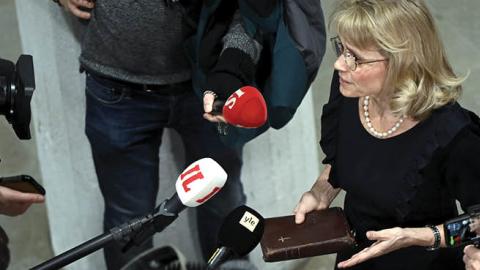Finland’s Helsinki District Court is now considering criminal hate speech charges against a Christian Democratic parliamentarian and a Lutheran bishop for tweeting Bible verses and stating that homosexual activity is forbidden in the Bible. The state prosecutor argues that they have “threatened, defamed or insulted” the gay and transgender community, in violation of Article 10 of the Criminal Code, which carries penalties of up to two years’ imprisonment and fines, as well as the implied future censorship of such traditional religious beliefs.
The court will have no room for a Solomonic splitting of the baby or a Utah Compromise-style solution that gives each side something. Moreover, the nature of hate speech laws and their precedents in Finland suggests that this pivotal case will be decided on political grounds, not legal reasoning or the consideration of cultural and historical traditions, and will lack basic due process.
The trial is the culmination of a two-year investigation triggered by a tweet that MP Paivi Rasanen sent in June 2019, objecting to the Evangelical Lutheran Church of Finland (a state church) over its cosponsoring of Helsinki’s LGBT Pride parade. The parliamentarian also linked on Instagram to a photograph of a biblical passage, Romans 1:24-27, that is critical of homosexual relations. She explained that she did not intend to offend, only to defend her deeply held religious beliefs.
The police questioned her for almost four hours, including about Apostle Paul’s letter to the Romans, and concluded that no crime had been committed. However, Prosecutor General Raija Toiviainen came to a different conclusion, reopened and expanded the investigation, and eventually charged her not only for the tweet but for her booklet, Male and Female He Created Them: Homosexual Relations Challenge the Christian Concept of Humanity, which is posted online. The prosecutor also charged Bishop Juhana Pohjola for publishing Rasanen’s book in 2004, seven years before the law was amended to protect gay and transgender people. The two are now being prosecuted for the crime of “ethnic agitation” under a wide-ranging hate speech law.
Europe’s vaguely worded hate speech laws, which rely on the subjective feelings of members of certain protected groups without requiring any evidence of actual harm or violent action, lend themselves to prosecutorial abuse. Research for our book on blasphemy laws, Silenced, revealed that Finland’s hate speech law is particularly susceptible to being used to score political points and suppress opponents, as it additionally dispenses with the need for the protected group to be involved in the complaint and effectively makes even reasoned criticism a criminal act.
The case of another parliamentarian, Jussi Halla-aho, provides insights into what to expect when hearings resume on Feb. 14 — and demonstrates the extremes to which Finnish prosecutors and courts are willing to go to get convictions. Some 10 years ago, Halla-aho was convicted of “defaming religions” for writing negative blog posts about Islam. After the police decided to drop its investigation into particular posts, the government combed through his extensive blog site on free speech, finally charging him with defaming Islam. At trial, the court declared Halla-aho’s reasoning, presented in his defense, inadmissible because “[l]ogic and so-called arguments of reason have no true significance in debating religious questions.” Halla-aho was found guilty and fined after the court ruled that he had not intended to engage in a sincere discussion of Islamic beliefs. His conviction was upheld by Finland’s Supreme Court, which raised his fine for good measure.
Like Halla-aho, Rasanen is a successful politician. She was the chairwoman of Finland’s Christian Democratic Party from 2004 to 2015 and the minister of the interior from 2011 to 2015, raising concerns that this case, too, is a political one. One of the charges, based on a publication long predating the amendment including gay and transgender people, appears to be an ex post facto application of the hate speech law, a violation of basic due process. But the most serious due process flaw is the vagueness of the law itself. What notice was there before this prosecution that a traditional teaching of Christianity was now criminalized? Will investigations begin against Jewish, Muslim, and other preachers because of the same traditional teaching? In a country where over 70% support gay marriage, what evidence exists of any incitement, much less “ethnic” agitation, as the crime is officially called?
On the opening day of the hearing, on Jan. 24, the court reviewed Bible passages and assumed a quasi-papal role in trying to determine Christian teaching on marriage and sexuality and which interpretation of Scripture should be followed: the traditional or the liberal one. It appeared to be looking for a way to avoid outright censorship of the Bible or, at least, not be forced to lock it away in a secure archive that requires a state pass to read it, such as in China.
It remains to be seen whether the court will give any weight to Finland’s millennium-old Christian tradition and common beliefs about marriage (gay marriage only became legal in Finland in 2017) and permit continued debate on public issues — and whether it will consider the central importance of the freedoms of speech and religion in a democracy. These freedoms were established to protect unpopular, even heretical, beliefs and opinions. The irony is that it was the freedoms of religion and speech that brought about the acceptance of gay marriage in Finland.
The decision in the Finland case will be momentous. Convictions on this controversial subject will erode the twin freedoms at the foundation of the state’s democracy. A Western secular court will have set a new precedent in deciding permissible Christian teaching and establishing “certain boundaries.” This trial bears close watching.
Read in Washington Examiner





















